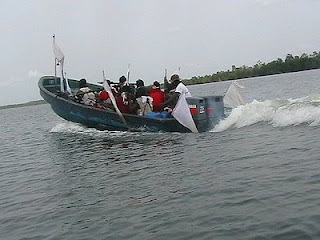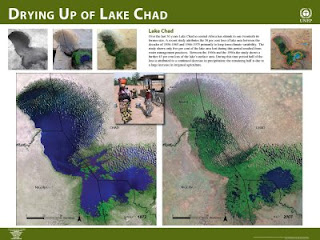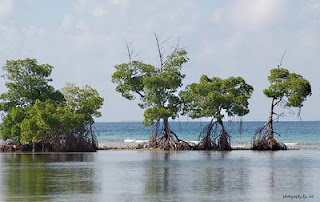-
Weekly Reading
›An alert from USAID’s Famine Early Warning Systems Network warns that despite generally good rains, “conflict, livestock disease, and high prices for cereals and other essential goods have minimized the extent to which pastoralists can benefit from these rains, undermining their recovery from drought and elevating their food insecurity, which is evidenced by alarming rates of child malnutrition in several areas.”
The UN Security Council held a special session on gender-based violence this week, and the New York Times’ Nicholas Kristof applauded the Council’s (belated) attention to the issue. ECSP recently sponsored an event on gender-based violence in conflict and post-conflict situations.
East Timor’s citizens are demanding that the government revoke an MOU signed with an Indonesian company that would grant the company 100,000 hectares of land to plant sugarcane. -
Danger: Demographic Change Approaching
›June 20, 2008 // By Rachel Weisshaar“From ‘youth bulges’ in the Muslim world to a population implosion in Russia to ‘premature aging’ in China, striking demographic trends the world over will reshape the future environment for U.S. policy,” says a new report from the Center for Strategic and International Studies, which aims to provide a comprehensive analysis of how demographic change will affect national and international security in the 21st century. As its title—The Graying of the Great Powers: Demography and Geopolitics in the 21st Century—indicates, the report focuses primarily on aging populations in developed countries, although one chapter does address the developing world.
The Graying of the Great Powers does a thorough job exploring the economic, geopolitical, and cultural implications of aging in Europe, Japan, and the United States, and it is to be praised for its readability and attention to concrete policy implications. But its focus on the developed world sometimes causes it to downplay the serious economic, socio-political, environmental, and security challenges posed by high population growth in developing countries—and by a global population that is expected to top 9 billion by 2050.
For instance, the authors use the past tense to refer to a time “when the prevailing worry was overpopulation.” Now, the word “overpopulation,” with its implication that some of us should not be here, is somewhat problematic. Nevertheless, it is clear that today, billions of human beings are consuming record amounts of natural resources at unsustainable rates—witness Yemen, where current annual water use is 30 percent greater than renewable water resources. Furthermore, many of the countries least able to provide employment and health care to their citizens have the highest population growth rates—for instance, Somalia and Afghanistan, which both have total fertility rates of 6.8 children per woman.
Wrapped up in their worries about the impact of low birth rates on armed services recruitment and government spending on pensions and health care for the elderly, the authors seem to forget what is actually at stake here: a woman’s decision to give birth to a child. Politicians can institute reforms that will make having children an easier proposition, but they should not pressure people to have children because they wish to avoid geopolitical upheaval. Ultimately, wanting to have a child is the only good reason to bring one into the world. -
MEND Makes Headlines With Most Ambitious Oil Attack Yet
›June 19, 2008 // By Sonia Schmanski The Movement for the Emancipation of the Niger Delta, or MEND (seen in a photo by Dulue Mbachu, courtesy of ISN Security Watch and Flickr), has attacked Nigeria’s oil infrastructure again, this time significantly enough to cause Royal Dutch Shell to suspend its production at the damaged facility. Worldwide crude price levels rose in the wake of the attack, as well as amidst concerns that a Nigerian oil worker strike could be imminent.
The Movement for the Emancipation of the Niger Delta, or MEND (seen in a photo by Dulue Mbachu, courtesy of ISN Security Watch and Flickr), has attacked Nigeria’s oil infrastructure again, this time significantly enough to cause Royal Dutch Shell to suspend its production at the damaged facility. Worldwide crude price levels rose in the wake of the attack, as well as amidst concerns that a Nigerian oil worker strike could be imminent.
The attack, which took place today in the Bonga oil field some 75 miles off Nigeria’s coast, is being described as unusually ambitious for a group that has focused mainly on the creeks and swamps of the Niger Delta. In a statement released to the media, the group explained that “the location for today’s attack was deliberately chosen to remove any notion that off-shore oil exploration is far from our reach.” Shell spokeswoman Eurwen Thomas said that the attack marked the first time MEND has managed to achieve the sophisticated planning and acquire the advanced equipment required to successfully target such a remote rig.
Though Nigeria is Africa’s biggest oil producer and a member of OPEC, most areas remain mired in poverty and plagued by pollution. Widespread resentment over inequitable revenue disbursement has spawned numerous groups agitating for a greater share of the country’s vast oil wealth. MEND is only the latest of these groups, but it has made a name for itself through attention-grabbing attacks like this one. The group’s claim to have captured an American worker was substantiated by private security officials, who said that two other workers were injured. Since the upswing in violence that began in early 2006, Nigerian rebel groups have taken more than 200 hostages.
Eleven percent of U.S. oil imports—46 percent of Nigeria’s total production—come from Nigeria, making this escalating series of attacks particularly relevant to American officials, and perhaps providing incentives to mediate talks between Nigeria’s government and Niger Delta militants, which have thus far been unsuccessful. Yet negotiations will be difficult between such polarized players. Said MEND, “the oil companies and their collaborators do not have any place to hide in conducting their nefarious activities.”
-
New International Peace Institute Paper Examines Resource Scarcity, Insecurity
›June 18, 2008 // By Daniel Gleick“Often, those who are already vulnerable to threats because they are poor, illiterate, lack political power, or face gender or ethnic discrimination are the ones who find themselves in the front lines of the negative dimensions of environmental change,” writes Richard Matthew of the Center for Unconventional Security Affairs at the University of California, Irvine, in “Resource Scarcity: Responding to the Security Challenge,” a new paper from the International Peace Institute. Vulnerable populations “face water and land scarcity, are displaced into marginal ecosystems where they encounter unfamiliar parasites, experience severe weather events, lose everything to floods and mudslides, and daily eke out an existence in peri-urban areas awash with human waste.”
Researchers continue to debate the security implications of various kinds of resource scarcity, but according to Matthew, there are at least four areas of general agreement:
• Resource scarcity is never the sole cause of conflict, but is often a contributing factor;
• Migration is frequently the link between resource scarcity and conflict;
• Rapid changes in access to resources are more likely to cause conflict than gradual changes; and
• Climate change will lead to resource scarcity in many areas that are experiencing or vulnerable to conflict.
Despite these dire circumstances, Matthew believes key actions and policies could significantly reduce the likelihood that resource scarcity will lead to conflict and insecurity. He offers 14 specific recommendations for NGOs, governments, and international organizations, which include supporting “the effort in UNEP to integrate the environment into post-conflict assessment, disaster management, and peacebuilding” and mobilizing “the enormous capacity of the private sector and NGO communities…around sustainable development, conflict resolution, and peacebuilding.”
-
Africa Atlas’s Exquisite Images Reveal Effects of 40 Years of Environmental Degradation
›June 16, 2008 // By Daniel Gleick On June 10, at the 12th session of the African Ministerial Conference on the Environment, the UN Environment Programme (UNEP) released Africa: Atlas of Our Changing Environment, a comprehensive look at the environmental devastation being wrought in Africa. Highlighting the ecological damage caused by high population growth, climate change, and the unsustainable use of natural resources, the atlas shows before-and-after satellite images of “disappearing forests, shrinking lakes, vanishing glaciers and degraded landscapes.” The above image, courtesy of UNEP, shows how Lake Chad has shrunk to one-twentieth of its size 30 years ago.
On June 10, at the 12th session of the African Ministerial Conference on the Environment, the UN Environment Programme (UNEP) released Africa: Atlas of Our Changing Environment, a comprehensive look at the environmental devastation being wrought in Africa. Highlighting the ecological damage caused by high population growth, climate change, and the unsustainable use of natural resources, the atlas shows before-and-after satellite images of “disappearing forests, shrinking lakes, vanishing glaciers and degraded landscapes.” The above image, courtesy of UNEP, shows how Lake Chad has shrunk to one-twentieth of its size 30 years ago.
As The Independent put it: “Put it all together and you have a picture that is hard to credit, so enormous is the destruction.” Much of the impetus behind the atlas was to spur African governments to improve their environmental records.
On July 1, ECSP will host UNEP Executive Director Achim Steiner at the Washington, DC, launch of the atlas. -
This Mangrove Forest Could Save Your Life: Protected Areas and Disaster Mitigation
›June 16, 2008 // By Sonia Schmanski Natural disasters “are not ‘natural’ at all but are the consequence of our scant regard for the ecosystem services our natural environment provides,” write the authors of “Natural Security: Protected areas and hazard mitigation,” fifth in the Arguments for Protection series published jointly by the World Wildlife Fund and Equilibrium.
Natural disasters “are not ‘natural’ at all but are the consequence of our scant regard for the ecosystem services our natural environment provides,” write the authors of “Natural Security: Protected areas and hazard mitigation,” fifth in the Arguments for Protection series published jointly by the World Wildlife Fund and Equilibrium. -
Public Health in the Wake of Disasters: An Overlooked Security Issue
›June 16, 2008 // By Kai Carter“Public health and public health infrastructure and systems in developed and developing countries must be seen as strategic and security issues that deserve international public health resource monitoring attention from disaster managers, urban planners, the global humanitarian community, World Health Organization authorities, and participating parties to war and conflict,” argue Frederick Burkle and P. Gregg Greenough of the Harvard Humanitarian Initiative in a new article in Disaster Medicine and Public Health Preparedness. Burkle, who is currently a public policy scholar at the Wilson Center, will discuss public health management after natural disasters at the Center on June 17th.
In their article, “Impact of Public Health Emergencies on Modern Disaster Taxonomy, Planning, and Response,” Burkle and Greenough discuss the public health consequences of disasters, which they classify as natural; failures of human or technological systems; or conflict-based. The authors contend that disasters’ indirect effects are often overlooked, despite the fact that they continue months and even years after the event. Disaster severity is typically measured by direct morbidity and mortality; however, Burkle and Greenough highlight the need to account for the indirect deaths and illnesses caused by the devastation of public health and other infrastructure, poor and overcrowded living conditions, displacement, food insecurity, and disrupted livelihoods. Furthermore, as acute deaths decrease, humanitarian aid wanes—at a time when it is desperately needed to rebuild public health infrastructure.
In the case of conflict-based disasters,“health care and other essential services . . . may not return to baseline for more than a decade.” The authors note that in 2004, the Iraqi Ministry of Health announced that more lives had been lost to insufficient health services than to violence. Yet the former fails to garner the same attention and condemnation as the latter.
The devastation wrought by Hurricane Katrina demonstrated that the safety, health, and infrastructure of even the wealthiest nations are at risk. No nation can afford to overlook the challenges highlighted by Burkle and Greenough. -
Weekly Reading
›New Day, New Way: U.S. Foreign Assistance for the 21st Century, a report from the Modernizing Foreign Assistance Network, was unveiled at a packed House Foreign Affairs Committee event this week.
The Economist continues to brush off those who worry that there are too many people consuming too many resources on Earth: “If global growth and development continue, worries about overpopulation may, in hindsight, seem a uniquely 20th century phenomenon.”
“Countries that stagnate are less able and sometimes less willing to help address transnational issues, many of which originate within their borders, including illegal migration; trafficking in narcotics, weapons, and persons; health threats such as HIV/AIDS and avian flu; and environmental concerns such as loss of biodiversity,” says USAID’s economic growth strategy.
“We know that the cruel indignities of life without clean water, adequate sanitation, sustainable livelihood, or democratic governance can deny us our basic freedoms as surely as any despotic regime,” says Condoleezza Rice, quoted in USAID’s report Expanding the Impact of Foreign Assistance Through Public-Private Alliances.
The Commission on HIV/AIDS and Governance in Africa, headed by Wilson Center collaborator K. Y. Amoako, presented its report Securing Our Future to UN Secretary-General Ban Ki-moon earlier this week.
 A Publication of the Stimson Center.
A Publication of the Stimson Center.

 The Movement for the Emancipation of the Niger Delta, or MEND (seen in a photo by Dulue Mbachu, courtesy of ISN Security Watch and
The Movement for the Emancipation of the Niger Delta, or MEND (seen in a photo by Dulue Mbachu, courtesy of ISN Security Watch and  On June 10, at the 12th session of the
On June 10, at the 12th session of the  Natural disasters “are not ‘natural’ at all but are the consequence of our scant regard for the ecosystem services our natural environment provides,” write the authors of “
Natural disasters “are not ‘natural’ at all but are the consequence of our scant regard for the ecosystem services our natural environment provides,” write the authors of “

